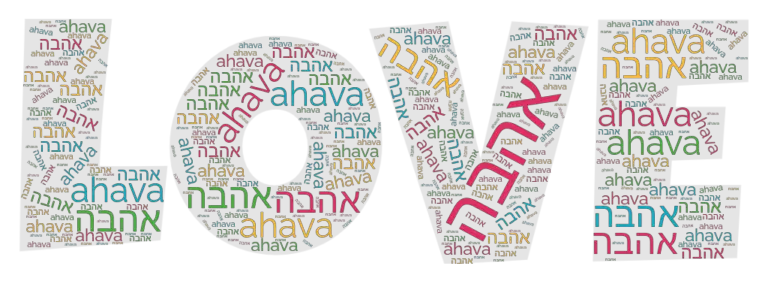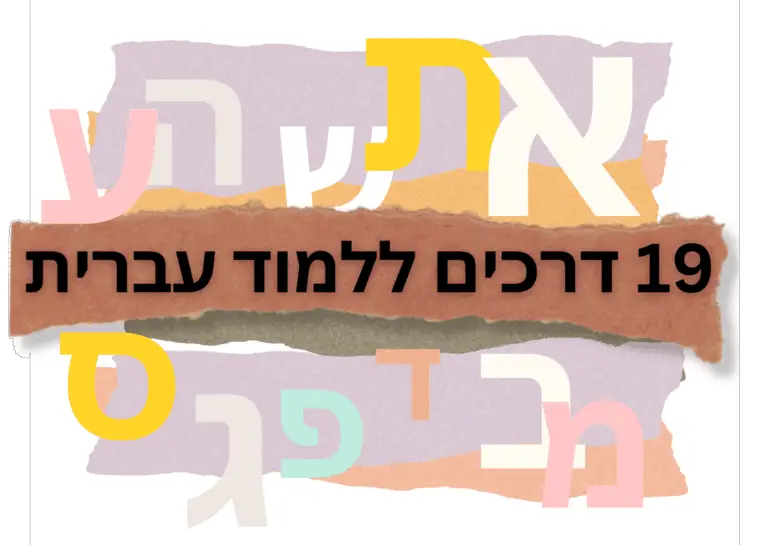Saying I love you in Hebrew is pretty straightforward.
![]() Or is it?
Or is it?
When we say ‘I love you’ in our native language, we rarely think about the meaning, tradition, and history packed into those three little words. We just say it, feeling the warmth of the phrase rather than examining its linguistics. However, when you step into a new language – say, Hebrew – expressing love becomes a journey of discovery, full of cultural details, historical connections, and even influences from other languages.
In this blog post, we’ll explore the fascinating world of expressing love in Hebrew. Building on our previous exploration of the Hebrew word for love, “אהבה” (Ahavah), we’re now transitioning to a more practical aspect: saying ‘I love you’ in Hebrew. Not only will we discuss the often overlooked complexities and cultural contexts, but we’ll also tackle the confusions that inevitably come with the territory. And as a special bonus, we’ll reveal other common terms of endearment and even a few songs.
This journey goes beyond just helping you say ‘I love you’ in Hebrew. It’s about understanding the intricate ways love is communicated in a culture different from your own. And even if you’ve been living in Israel for years (like me!), you might discover a thing or two you didn’t know.
So, let’s step into this world of linguistic affection and unearth the heartwarming treasures it holds. I’ve also included a chatbot at the end so you can questions if something isn’t clear.
The Basics of Hebrew and Expressing Love
Before going into the complexities and nuances of expressing love in Hebrew, let’s quickly revisit the basics of the language itself.
The Hebrew Language: A Quick Recap
Hebrew, a Semitic language, has its roots embedded deep in history. Primarily spoken in Israel, and co-existing with Arabic as the official language, Hebrew is the only language to be revived from “dead language” status. The Hebrew language also has some unique characteristics. For example:
- The Hebrew alphabet is comprised of 22 consonant letters. Unlike English, it is written from right to left and does not have distinct uppercase or lowercase forms.
- In addition to the standard forms of these letters, five of them take on a different form when situated at the end of a word. These are known as the final forms of the letters, and they include: ך (final kaf), ם (final mem), ן (final nun), ף (final pe), and ץ (final tzadi).
- Instead of having dedicated vowel letters like in many languages, Hebrew represents vowels using diacritic marks, called “niqqud,” which are placed around the consonants.
- The pronunciation of letters in Hebrew can vary based on their position in a word and their corresponding vowel diacritics. An example of this is the letter ‘ש’ (Shin), which can sound like ‘sh’ or ‘s’, depending on the context.

One of the defining characteristics of Hebrew is its gender system. Every noun and verb can take masculine or feminine forms, depending on the subject or the object being referred to. For example, a window is “feminine” and a door is “masculine,” and the grammar of a given sentence will reflect this. I admit that it’s a little confusing for me even now, after living in Israel for 27 years, to remember the gender of objects. It is, however, particularly important when expressing personal feelings or emotions.
Saying ‘I Love You’ in Hebrew: The Basics
In Hebrew, saying ‘I love you’ is not as simple as it is in English. The expression changes based on the gender of both the speaker and the listener, adding a layer of specificity and personal touch to it.
A man expressing his love to a woman says, “אני אוהב אותך” (Ani ohev otach), while a woman expressing her love to a man would say, “אני אוהבת אותך” (Ani ohevet otcha). You might notice the difference lies in the word ‘אוהב/אוהבת’ (love) and ‘אותך’ (you), adapting to the gender of the speaker and the listener respectively.
So, to help you understand the variations of expressing love in Hebrew based on speaker and listener’s gender, here is a detailed table:
| Speaker | Listener | Phrase in Hebrew | Transliteration |
|---|---|---|---|
| Male | Female | אני אוהב אותך | Ani ohev otach |
| Male | Male | אני אוהב אותך | Ani ohev otcha |
| Female | Male | אני אוהבת אותך | Ani ohevet otcha |
| Female | Female | אני אוהבת אותך | Ani ohevet otach |
| Male | Group | אני אוהב אתכם | Ani ohev etchem |
| Female | Group | אני אוהבת אתכם | Ani ohevet etchem |
| Male | Group of Females | אני אוהב אתכן | Ani ohev etchen |
| Female | Group of Females | אני אוהבת אתכן | Ani ohevet etchen |
Such intricacies of Hebrew make it an interesting and admittedly sometimes challenging language to learn. And getting it right becomes all the more important when you’re expressing emotions like love
Common Misunderstandings When Expressing Love in Hebrew
Learning to speak a foreign language can sometimes lead to confusing situations, and learning Hebrew is no different. One such area of potential confusion for English speakers lies in the blurry line between ‘like’ and ‘love’ in Hebrew. So, let’s clear up the confusion.
The Blurred Lines: ‘Like’ vs. ‘Love’ in Hebrew
In English, ‘like’ and ‘love’ are quite distinct. ‘Like’ represents a fondness or enjoyment of someone or something, while ‘love’ signifies a deep affection or intense feeling of warmth. The difference is stark, and their usage is relatively straightforward.
In Hebrew, however, these lines are a bit blurred. The Hebrew word for ‘love’ is ‘אהבה’ (Ahava), and it’s widely used to express both ‘like’ and ‘love’. On the other hand, the direct Hebrew equivalent for ‘like’, which is ‘מחבב’ (mechavev) for a male speaker and ‘מחבבת’ (mechavevet) for a female speaker, is not as commonly used.
So, in everyday conversation, a Hebrew speaker might use ‘Ahava’ to express both ‘like’ and ‘love’. For instance, if someone says “אני אוהב את החתול שלך” (Ani ohev et ha’hatul shelcha), it could mean “I love your cat,” as in English, but it might also just mean “I like your cat.” The difference is often inferred from the context and enthusuasm of the speaker.
This overlap can be confusing for English speakers learning Hebrew. It can lead to situations where emotions are unintentionally magnified. Imagine telling someone you love their point of view when you merely like it!
Overcoming the Confusion
The key to navigating this linguistic quirk lies in understanding the context and the relationship between the speaker and the listener. While ‘Ahava’ might be used more frequently, the true intent can often be gauged by the depth of the relationship or the emotional tone of the conversation.
So, when you’re learning to express your feelings in Hebrew, be aware of this potential pitfall. Remember, context is king when deciphering the difference between ‘like’ and ‘love’. Understanding this will help you better express your feelings and avoid any potential miscommunications.
In the next section, we will explore more ways of expressing affection in Hebrew that go beyond just saying ‘I love you’. You’ll see how the Hebrew language beautifully captures the entire spectrum of fondness, making it even more charming and heartfelt.
Expressions of Love in Hebrew
Hebrew, with its rich historical and cultural tapestry, is an expressive language that offers numerous ways to convey feelings of love, admiration, and affection. Saying “I love you” in Hebrew is just the tip of the iceberg. There are many more phrases, terms of endearment, and compliments that can help you express your love more creatively and passionately.

Hebrew Terms of Endearment
In Hebrew culture, people often use affectionate nicknames or terms of endearment to express love and closeness. These can be used among family members, between friends, or in romantic relationships. Here are some commonly used terms:
יקירתי (Yakirati) – “My dear” when addressing a female.
יקירי (Yakiri) – “My dear” when addressing a male.
נשמה (Neshama) – “Soul,” a term of deep affection and closeness.
חיים שלי (Chayim Sheli) – “My life,” an expression of profound love and commitment.
לב שלי (Lev Sheli) – “My heart,” a loving term often used in romantic relationships.
מאמי (Mami) – “Mami,” borrowed from Spanish, this term is used in a casual and affectionate way, similar to “babe” or “honey.”
מותק (Motek) – “Sweetie,” a very common term of endearment used for both genders, derived from the word “Matok” which means sweet.
These terms add a layer of warmth and personal touch when expressing your love in Hebrew. However, they might not always be used to convey romantic affection. To get a younger perspective on this topic, I turned to my Hebrew-speaking high school students. Ella, a particularly insightful young lady, astutely pointed out that these terms are often thrown around casually in everyday conversations, and don’t necessarily imply love or romantic interest. Her observations reminded me that language is ever-evolving, reflecting the dynamic nature of culture and societal trends.
In fact, you might be out shopping and the grocer playfully says “Neshama shely, you won’t find better avocados”, further highlighting the richness and versatility of the Hebrew language and Israeli culture.
Compliments and Praise in Hebrew
Compliments and praise are excellent ways to express your love and admiration for someone. As in every languages, they make the other person feel valued and appreciated. In Hebrew, there are specific phrases that you can use to compliment someone:
את מהממת (At mehamemet) – “You are amazing” when speaking to a female.
אתה מהמם (Ata mehamem) – “You are amazing” when speaking to a male.
את יפה (At yafa) – “You are beautiful” when complimenting a female.
אתה יפה (Ata yafe) – “You are handsome” when complimenting a male.
אני גאה בך (Ani ge’e ba’akh) – “I’m proud of you” is gender-neutral and conveys admiration and respect.
Love Idioms in Hebrew
Hebrew, as with many languages, is abundantly rich with idioms, particularly on the subject of love. Indeed, these colorful expressions provide fascinating insights into the cultural nuances of expressing love in Hebrew.
“אהבה ממבט ראשון” (Ahava me-mabat rishon)
This idiom is the Hebrew version of the phrase “love at first sight”. It describes an immediate attraction or connection upon meeting someone for the first time.
“תפש את ליבי” (Tafas et libi)
This idiom means “He captured my heart,” and is used when someone has fallen deeply in love or is very attracted to someone. It’s an emotive phrase that expresses strong affection.
“לפתוח את הלב” (Liftokh et ha-lev)
The literal translation is “to open the heart,” and it is used when someone wants to have a deep, honest conversation, often about feelings or intimate topics. In the context of love, it signifies the willingness to be vulnerable and open up emotionally.
“לקח לי את הלב” (Lakach li et halev)
This phrase, which directly translates as ‘He stole my heart,’ is comparable to the same expression in English. Typically, one might use it to describe the surprising or overwhelming experience of falling in love.
These idioms add flavor and depth to the language and are examples of how modern Hebrew speakers conceptualize and communicate in Hebrew. They not only express feelings but also tell a story, providing a window into the culture and the Hebrew way of expressing love. In the next section, we’ll discuss the art of writing love letters in Hebrew.

Expressing Love Beyond Words in Israeli Culture
In Israeli culture, love finds expression not only through spoken words but also through a variety of gestures, actions, and traditions. Verbal communication alone does not limit the scope of love’s manifestation in this culture.
Sharing Food
In Israel, food is not merely nourishment; it is a significant undertaking of hospitality and a profound expression of love whether or not words are being spoken. The act of preparing and sharing food symbolizes care and fosters connection among people. During every meal, you’ll encounter the heartfelt Hebrew phrase “בתיאבון” (bet’eavon), meaning “enjoy your meal.” This phrase beautifully reflects the warmth and affection that Israelis infuse into their vibrant food culture. It is interesting to note that the English language lacks an equivalent term and has had to borrow “bon appétit” from French.
Tending to One’s Well-Being
In Israeli culture, expressions of love often extend far beyond words, becoming inherently woven into actions related to one’s well-being. For Israelis, caring for a loved one is an implicit understanding, a natural part of their expression of affection that doesn’t necessitate asking. Whether it’s ensuring a loved one is well-fed, keeping them warm, ensuring their safety, or merely inquiring about their health or offering help with a task – these acts are viewed not just as gestures, but as intrinsic demonstrations of love and care. It’s a powerful cultural norm that stands out, particularly for those from cultures where such proactive care is not a given.
Physical Affection
In Israeli culture, expressing love goes beyond mere words. Physical affection holds a vital place in this demonstration of love. Whether it’s close friends and family engaging in heartfelt hugs, warm kisses on the cheek during greetings or farewells, or simply holding hands while walking, the barriers of reserve often seen in other cultures are replaced with uninhibited displays of affection. This genuine physicality underscores the candid, emotionally open nature of Israeli society, where love is not just spoken, but also actively shown.
Well wishing
An additional word that encapsulates the warmth of Israeli culture is “תתחדש!” (Tit’chadesh!). It is used when someone notices you have something new, whether it’s a recent purchase or a new experience. This word carries a sentiment similar “May it bring you joy!” in English. It beautifully captures the essence of Israeli warmth and hospitality, expressing well wishes with elegance in just one word.
Famous Hebrew Love Songs
While we’re on the topic of love, why not explore a few classic Hebrew love songs? They not only offer a unique taste of the culture, but it’s also worth noting that songs are excellent tools for language learning. Now, let’s dive into these love songs!
A-Ba-Ni-Bi
“A-Ba-Ni-Bi”, an upbeat, beloved love song by Izhar Cohen and Alphabeta, marked Israel’s victory in the Eurovision Song Contest in 1978. This victory not only put Israel on the international musical map, but also signaled a change in music styles in the competition.
The unique aspect of “A-Ba-Ni-Bi” is its incorporation of “Bet Language”, a linguistic game akin to English Pig Latin, used commonly by Hebrew-speaking children. The phrase “Ani ohev otach” (“I love you” in Hebrew) becomes “a-ba-ni-bi o-bo-he-be-v o-bo-ta-ba-ch” in Bet Language. This inventive linguistic play embodies the secret whispers of childhood love, while the song overall serves as a reminder of the importance of expressing love openly in adulthood.
| Hebrew | Transliteration | English Translation |
|---|---|---|
| אהבה, | ahava, | Love, |
| היא מילה יפה, | hi mila yafa, | it’s a beautiful word, |
| היא תפילה יפה, | hi tefila yafa, | it’s a beautiful prayer, |
| היא שפה. | hi safah. | it’s a language. |
| אהבה, | ahava, | Love, |
| היא אלי טובה, | hi eli tova, | it is good to me, |
| היא תמיד תתגבר | hi tamid titgaber | it will always overcome |
| ובשפת אהבה | uv’sfat ahava | and in the language of love |
| נדבר. | nedaber. | we speak. |
Li VeLach
The ballad “Li VeLach”, sung by Arik Einstein and Geula Nuni, is another classic Israeli song that beautifully portrays the concept of shared love. It originates from the renowned Israeli film “Salah Shabati” (1964), which achieved significant international acclaim, being the first Israeli film nominated for an Oscar and winning a Golden Globe.
The phrase “Li VeLach” translates to “For me and for you”, underlining a sense of unity and shared affection. The song’s lyrics emphasize that the beauty of the world and life’s experiences are to be cherished collectively – a message that extends a sense of commonality and reciprocity in expressing love. This song is more than just a piece of film score; it has permeated Israeli culture and is often used to convey feelings of love and shared experiences.
| Hebrew | Transliteration | English Translation |
|---|---|---|
| בים הרוגע | Bayam haroga | In the calming sea |
| השמש שוקע | Hashemesh shoka | The sun is sinking |
| למי מתגעגע | Lemi mitga’ega | Who is yearning |
| לי ולך, לי ולך | Li velach, li velach | For me and for you, for me and for you |
| לי ולך | Li velach | For me and for you |
Shevet Achim Va’Achayot
Idan Raichel, a renowned Israeli singer-songwriter and musician, known for his Idan Raichel Project, released “Shevet Achim Va’Achayot” (A Tribe of Brothers and Sisters) in 2019. The song rapidly became popular in Israel and even gained international attention.
Through this beautiful song, Raichel delivers a strong message about the importance of love and unity within society at large. Not only have the evocative music and soulful lyrics made “Shevet Achim Va’Achayot” a modern Israeli classic and a significant addition to the tapestry of Israeli love songs, but it also brought together an incredible assortment of top Israeli talent. Artists young and old, representing every musical genre the country has to offer, join together in this stirring song. It is truly an exhibit of community, togetherness, and the bridging of boundaries. Be sure to watch the video till the end to see former Israeli President Ruby Rivlin recite the song’s chorus, which you can find in the table below.
| Hebrew | Transliteration | English Translation |
|---|---|---|
| ישראל | Yisrael | Israel |
| כאן זה בית, כאן זה לב | Kan zeh bait, kan zeh lev | Here is home, here is heart |
| וְאוֹתָךְ אנ’לא עוזב | Ve’otach ani lo ozev | And I will not leave you |
| אבותינו- שורשים | Avotenu – shorashim | Our fathers – roots |
| וַאֲנַחְנוּ הפרחים, המנגינות | Ve’anachnu haperachim, haminginot | And we are the flowers, the melodies |
| שֵׁבֶט אַחִים וַאֲחָיוֹת | Shevet achim va’achayot | A tribe of brothers and sisters |

Frequently Asked Questions
Q1: How do you pronounce “אני אוהב אותך” (Ani ohev otcha/Ani ohevet otcha)?
A1: The phrase is pronounced as “Ani o-hev ot-kha” when a man is speaking and “Ani o-hevet ot-kha” when a woman is speaking. The “kh” in “ot-kha” is a bit like the “ch” in Bach or loch.
Q2: Are there different ways to express “I love you” in Hebrew based on the formality of the situation?
A2: In Hebrew, the phrase “אני אוהב אותך” (Ani ohev otcha/Ani ohevet otcha) is quite standard across both formal and informal situations. However, tone and context are important. In more casual situations, you may see people use terms of endearment or shorter phrases to express affection.
Q3: How do you say “my love” in Hebrew?
A3: The term “my love” translates as “אהובי” (Ahubi) for a male and “אהובתי” (Ahuvati) for a female in Hebrew.
Q4: Are there specific phrases or words used to express love in Hebrew that aren’t common in English?
A4: Absolutely! Hebrew, like any language, has its unique expressions of love. A common one is “נשמה שלי” (Neshama Sheli), which literally translates to “my soul.” It is a term of deep affection and intimacy.
Q5: Why haven’t you included Hebrew words for love from the Bible in this post?
A5: While Biblical Hebrew love words offer rich insights, their practical usage has significantly changed in modern Hebrew, which has been the focus of this post. For a deeper exploration of the Biblical Hebrew words for love, including their meanings, and their evolving usage within Jewish culture, see our sister post “Unraveling the Hebrew Word for Love“.
Q6: How do I know when to use which gender form when expressing love in Hebrew?
A6: In Hebrew, the form you use often depends on your own gender and the gender of the person you’re speaking to. If you’re a man expressing love to a woman, you would say “אני אוהב אותך” (Ani ohev otach). If you’re a woman expressing love to a man, you’d say “אני אוהבת אותך” (Ani ohevet otcha).
Please use our chatbot if you have more questions or need further clarification on any point. We are here to assist you in your journey of learning and expressing love in Hebrew!
B’ahava
Expressing love in Hebrew is not simply a matter of translating words from English, but a rich and rewarding journey into the heart of Israeli culture. Whether you’re uttering a simple “אני אוהב אותך” (Ani ohev otcha/Ani ohevet otcha), using endearing terms such as “מותק” (Motek) or “חמודה” (Hamuda), or diving into the deep waters of Hebrew literature, you’re engaging in a cultural exchange.
Remember, practice is key when learning a new language. Try using these expressions in your daily life, and soon, expressing love in Hebrew will become second nature to you. If you have any additional questions or need further guidance, our chatbot is always here to assist you. Let’s continue this journey of love and language together, enriching our lives with the beauty and depth of Hebrew.
Till next time, באהבה (with love).




